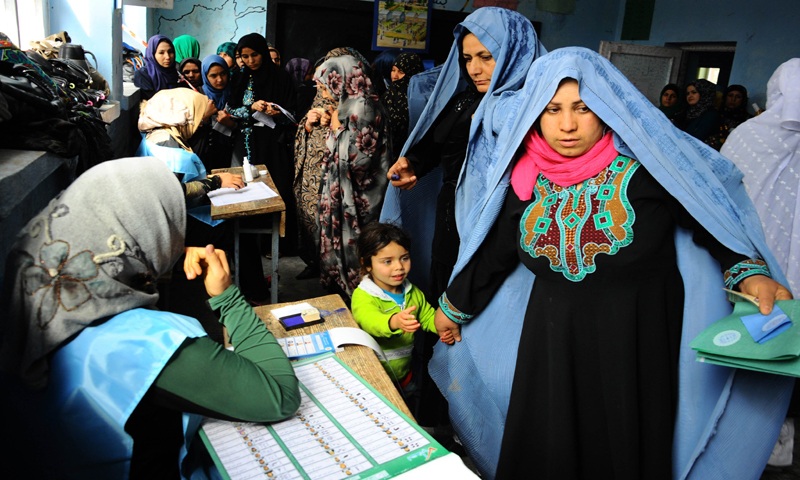Voters began to trickle in as soon as poll stations opened their doors in Kabul at 7am on Saturday. Yellow-vested police officers and khaki-clad Afghan soldiers stood guard in front of polling stations, cordoning off many of the capital’s entry and exit points, and tightly regulating its streets.
It was a day that had everyone on the edge of their seats. The Afghan Taliban had threatened to attack voters and polling stations. Voters, it was feared, might not turn out to cast their ballot. But as the day progressed, the spectacular attacks that everyone thought might rock the election, turned out to be few and far between.
And early reports suggested that voters turned out in record numbers: seven million out of 12 million eligible voters, a whopping 58 per cent, cast their ballot, according to the election commissioner.
“We need a president who will bring us peace and growth. And we are not afraid of anyone,” said Sayeda, a 27-year old voter at a school-turned-polling station in Kabul. As the morning turned into afternoon and evening, pictures began to circulate of voters lining up in long, winding queues that would snail around the corners of schools and community mosques.
They would wait until they, too, could dip their fingers in the invisible ink that was meant to stave off fraud and double-votes, and the dark blue ink that would allow them to mark off their choice of a candidate on the blue sheets issued by the election commission.
Global and local media celebrated the high turnout, calling the election “landmark” and “historic”. They congratulated Afghans for “[braving] fear[s] of violence [and fraud]”.
“Afghan hope prevails”, The Guardian said as polling stations opened. And, Afghanistan’s TOLO news channel announced that “Afghans and non-Afghans alike celebrated the day as an overwhelming success”.
A handful of attacks took place, but were far from the major operations that the state and its allies had feared. Dozens of reports trickled in about minor roadside bombs and attacks on polling stations, police and voters.
In the eastern province of Kunar, two voters and 14 Taliban militants were killed, and an additional 14 people were wounded. Rahmatullah Nabil, the head of the National Directorate of Security, called the elections a “slap to the faces of the terrorists.” And the largely peaceful election prompted officials from the election commission to congratulate the Afghan security forces for a job well done.
ANALYSTS COUNSEL CAUTION: “We have a good reason to be happy. A lot of things that could have gone wrong did not go wrong. High-profile attacks did not take place. And, it is clear that we witnessed a good turnout. But we need to give the election count a few days,” says Fabrizio Foschini, a researcher at Afghanistan Analysts Network.
As the day progressed, the election commission announced that an additional 211 polling stations would be closed throughout the country primarily because of security concerns, raising the total number to 959. Many of these polling stations were concentrated in areas like Nangarhar, which borders Pakistan, potentially taking the vote away from voters living in insecure and remote parts of the country.
Preliminary reports trickling in from journalists and election observers suggest that one of the other major challenges was a shortage of ballot papers. Polling centres started running out of ballots in areas including Kabul, and provinces that stretched from northern Takhar, north-eastern Badakhshan, eastern Paktia, and south-western Nimroz.
Some journalists and observers have celebrated the shortage as an indication that too many Afghans wanted to vote. But other analysts caution that the shortage needs to be looked at closely, and could have been a strategic attempt at disenfranchising blocs of voters supporting some candidates rather than others.
“Let us wait and see what happens. There will be allegations of fraud that need to be looked at closely, and fears persist that some voters have been deliberately disenfranchised,” says Foschini, as the election commission reported receiving 200 complaints at the time that Dawn went to print.













































Dear visitor, the comments section is undergoing an overhaul and will return soon.